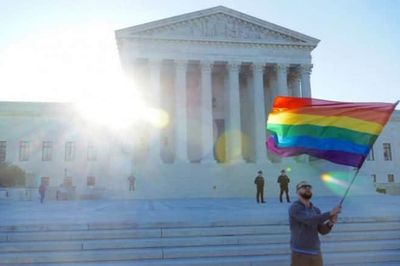Though clearly the fight for LGBT civil rights is far from over, it may be tempting to declare victory in the war for same-sex marriage, especially given the remarkable speed with which states, including Tennessee, complied with the order. After all, Davidson County was prepared to begin issuing same-sex marriage licenses within ONE HOUR after the order was handed down.
However, a number of states have resisted the roll-out of same-sex marriage via a variety of legal technicalities. And within our own home state, beyond the possibility of a legislative backlash, inconveniences and potential legal issues have already arisen that should give us pause.
Currently, some states are allowing county clerks to refuse to issue marriage licenses, citing a period of time during which states could ask the Supreme Court to reconsider its ruling. So far no state has seemed inclined to bring such a challenge, and it is even more unlikely that the court, having just ruled, would accept the challenge. In other cases, clerks are simply refusing to issue the licenses, on grounds of personal beliefs.
In Decatur County, Tennessee, the clerk and her staff did the right thing—they resigned rather than act against their “sincerely held religious beliefs.” They made a decision that they opposed the right to marry but did not infringe upon the rights of citizens.
In Kentucky, on July 9, 2015, Governor Steve Beshear ordered Casey County Clerk Casey Davis to begin issuing same-sex marriage licenses or resign. Not only did Davis refuse to resign, he also refused to issue the certificates, and only a lawsuit could really give anyone leverage to force him to take one of the governor’s options. He promised to “lean on the Lord,” and said he was willing to suffer jail for his beliefs.
But in Tennessee, where all counties came into compliance during the week following the ruling, the issue seems largely a moot point. All clerks are following the law: they are required to issue the licenses but not required to perform marriages. Citing various reasons, a number of clerks across the state have ceased providing marriage ceremonies. While this is their right, the confusion and inconvenience it causes affects all citizens, not just LGBT people.
If a county clerk refuses to perform a marriage and a couple has trouble finding a minister or to marry them (or doesn’t want a minister to marry them), they are entirely reliant on finding a public official to marry them. Civil marriage is precisely that—civil—and should not be held hostage by religion.
But if elected officials and other government-authorized agents refuse to do their duty and perform civil marriages, then they have created a situation where their religious beliefs dominate marriage in their region. Since in many counties where this has occurred officials have stopped performing all marriage, this subjects all couples to the whims of local religious leaders, or forces them to undertake the costs associated with traveling to find a place where they can get married.
Rebecca Davenport and Amy Hall have been together for eight years, and had a commitment ceremony in August 2010. Both have contributed to O&AN in the past and when marriage passed, Rebecca contacted me, entirely unsure of what to do. The couple is resident in Williamson County, and when they began to explore their options they found out that the office there had halted all weddings.
“We didn’t know what steps to take and were leery of taking them in Williamson County,” Davenport said, “which isn’t exactly gay friendly. We the found out that Williamson County had suddenly had a ‘budget crisis’ and said they were ‘unable’ to perform any weddings.”
As the logic of the clerks’ religious defenders goes, the answer is “get your license and find an officiant, or travel to Davidson County, if you don’t like it.” This is supposedly not an unfair burden—though the clerks themselves refuse on the ground of a supposed burden—but the couple explicitly did not want to be married by a religious figure, and the elected officials responsible for undertaking this duty weren’t stepping forward.
So Davidson County it was. “We inquired with the Davidson County Clerk’s Office about getting married by the Davidson County Clerk,” Davenport said. “We were told that, since we didn’t live in Davidson County, the Davidson County Clerk could not marry us.” Since county clerks answer to the citizens who pay their bills, this rule makes sense.
But it also shows that, if a clerk turns you away, you can’t always find another one. “So, not only were we turned away by the county clerk of our county of residence, Williamson, we were also unable to be married by the Davidson County Clerk. We had no choice but to find an officiant on our own since our own county refused to marry us.”
Friends, thankfully, were able to connect Davenport and Hall with one of Davidson County’s champions of LGBT rights, Councilman Peter Westerholm, who agreed to perform their ceremony. Not only did he meet them on their chosen day, he reserved the Nashville Metro Courthouse Council Chambers for the event, and the couple was legally married at 3:00 pm on July 16th, 2015.
The essential thing to remember here is that, had the couple not reached out to friends with sufficient connections, they might not have known to whom they could turn or have been able to arrange to have their marriage solemnized, forcing them to do what they did not want to do and seek out a minister or to defer indefinitely their legal rights. Consider that the next time a public official’s “sincerely held” beliefs seems compelling.
graphic via theleft.co
